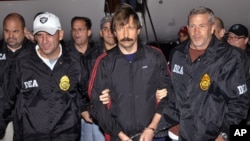WASHINGTON —
The Russian Ministry of Foreign Affairs has issued a travel warning telling Russians to refrain from trips abroad, especially to countries that have extradition treaties with the United States.
“Without any reasons the U.S. administration is refusing to recognize the reunification between Russia and Crimea that fully meets the international legal standards and the U.N. charter,” according to a statement on the ministry’s website. “It tries to make a routine practice out of hunting for Russian citizens in third countries with subsequent extradition and conviction in the USA, usually over dubious charges.”
The statement went on to cite Konstantin Yaroshenko and Viktor Bout--two convicted criminals--as examples of Russian citizens who have had this happen to them.
Yaroshenko was arrested in May of 2010 in Monrovia, Liberia, and was convicted of smuggling “thousand-kilogram quantities of cocaine," according to the U.S. Drug Enforcement Agency. Liberian officials turned him over to DEA officials two days after his arrest.
"While he was in DEA custody, the DEA followed the rules of law and the Geneva Convention regulations regarding treatment of a defendant," read a statement on the DEA website.
At the time, the Russian Foreign Ministry called the extradition a “kidnapping.”
Yaroshenko was sentenced to 20 years and was recently in the news after alleging he wasn’t receiving proper medical care in prison.
Bout, an arms dealer, is serving a 25-year sentence in the U.S after being convicted of conspiring to kill U.S. soldiers after selling arms to DEA informants who posed as members of the Revolutionary Armed Forces of Colombia (FARC). He was arrested in Thailand in 2008 and extradited to the U.S. in 2010.
Bout claimed he was a victim of a “vindictive” prosecution.
The Russian Foreign Ministry characterized the case as “absolutely unfair” and “political.”
Richard Kauzlarich, a senior fellow at the Brookings Institute, said the U.S. has "always been serious about organized crime, especially with someone like Bout who combines the worst aspects of organized crime."
A spokesman for the Russian Embassy in Washington mentioned Yaroshenko and alluded to “several examples” of these kinds of actions by the U.S., including Maksim Chuharev, who was extradited to the U.S. from Costa Rica in March to face charges of helping to operate a $6 billion money laundering scheme.
According to Russian government-owned television outlet, Russia Today (RT), the Foreign Ministry said Chuharev’s “extradition was carried out with serious procedural deviations and in violation of generally accepted international rules.”
Of the Russian warning, Kauzlarich said, "it seems like they're reaching out for any example."
"Two cases don't become a pattern, and it's not like we're going after Russians," he said. "If they're organized criminals, we're going to extradite them."
The U.S. State Department did not respond to a VOA request for information on Russia’s travel warning, or the three cases of individuals extradited to the U.S.
“Without any reasons the U.S. administration is refusing to recognize the reunification between Russia and Crimea that fully meets the international legal standards and the U.N. charter,” according to a statement on the ministry’s website. “It tries to make a routine practice out of hunting for Russian citizens in third countries with subsequent extradition and conviction in the USA, usually over dubious charges.”
The statement went on to cite Konstantin Yaroshenko and Viktor Bout--two convicted criminals--as examples of Russian citizens who have had this happen to them.
Yaroshenko was arrested in May of 2010 in Monrovia, Liberia, and was convicted of smuggling “thousand-kilogram quantities of cocaine," according to the U.S. Drug Enforcement Agency. Liberian officials turned him over to DEA officials two days after his arrest.
"While he was in DEA custody, the DEA followed the rules of law and the Geneva Convention regulations regarding treatment of a defendant," read a statement on the DEA website.
At the time, the Russian Foreign Ministry called the extradition a “kidnapping.”
Yaroshenko was sentenced to 20 years and was recently in the news after alleging he wasn’t receiving proper medical care in prison.
Bout, an arms dealer, is serving a 25-year sentence in the U.S after being convicted of conspiring to kill U.S. soldiers after selling arms to DEA informants who posed as members of the Revolutionary Armed Forces of Colombia (FARC). He was arrested in Thailand in 2008 and extradited to the U.S. in 2010.
Bout claimed he was a victim of a “vindictive” prosecution.
The Russian Foreign Ministry characterized the case as “absolutely unfair” and “political.”
Richard Kauzlarich, a senior fellow at the Brookings Institute, said the U.S. has "always been serious about organized crime, especially with someone like Bout who combines the worst aspects of organized crime."
A spokesman for the Russian Embassy in Washington mentioned Yaroshenko and alluded to “several examples” of these kinds of actions by the U.S., including Maksim Chuharev, who was extradited to the U.S. from Costa Rica in March to face charges of helping to operate a $6 billion money laundering scheme.
According to Russian government-owned television outlet, Russia Today (RT), the Foreign Ministry said Chuharev’s “extradition was carried out with serious procedural deviations and in violation of generally accepted international rules.”
Of the Russian warning, Kauzlarich said, "it seems like they're reaching out for any example."
"Two cases don't become a pattern, and it's not like we're going after Russians," he said. "If they're organized criminals, we're going to extradite them."
The U.S. State Department did not respond to a VOA request for information on Russia’s travel warning, or the three cases of individuals extradited to the U.S.




